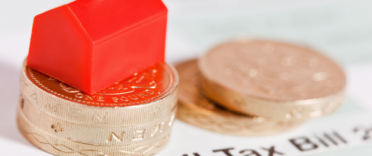
Council tax is payable to your local council in England, Scotland and Wales and covers services such as household rubbish collection, policing and education. How much council tax you pay depends on different factors including the size of your property, where you live and your personal circumstances. If you live in Northern Ireland you will pay something else called domestic rates.
In this article, we share ways you could save money on your council tax and what to do if you're struggling to pay your council tax. For a more in-depth look at council tax and how it works read our council tax guide.
How to save money on your council tax
Council tax is a priority debt, meaning it must be paid in favour of some other bills or money you owe. Not paying your council tax can lead to further financial problems and you can end up paying court fees and bailiff costs in addition to the money you owe. If you're struggling to pay your council tax or want to know what happens if you don't pay your council tax, you can find out later in the article in the section "What to do if you’re struggling to afford your council tax".
Check if you need to pay council tax
If you are over the age of 18 and own or rent a home you are generally responsible for paying council tax and if two adults live together in a property (e.g a partner or spouse) both are liable for paying the council tax bill regardless of whose name is on the bill. There are, however, some instances where council tax is not payable and you may be classed as 'disregarded', examples of which we list below.
You may not need to pay council tax if:
- You are under the age of 18
- You are a full-time student at college or university
- You are 18 or 19 years old and in full-time education
- You are on a certain apprenticeship scheme
- You are under 25 years old and get funding from the Education and Skills Funding Agency
- You are a student nurse
- You are a foreign language assistant registered with the British Council
- You are severely mentally impaired
- You are a live-in carer for someone who is not your partner, spouse, or child under 18
- You are a diplomat
If you think you are entitled to a council tax discount or exempt from paying council tax you will still need to apply for a discount or exemption.
Check if you’re entitled to a council tax reduction
If you are not exempt from paying council tax you may still be eligible for a discount e.g if you are a single occupant of your property, you are on a low income or if you are disabled. Additionally, there are instances where the property is exempt from council tax, e.g the property is empty due to refurbishment or the property is being sold as someone has died.
Circumstance council tax discount
You may be entitled to a discount on your council tax bill and how much discount you can get will depend on your personal circumstances. Below we give some examples of discounts on a council tax bill but further information on whether you are eligible for a council tax discount or exemption can be found by contacting your local council.
- Single occupant - If you live on your own you may qualify for a 25% discount on your council tax
- Single adult household - If you are a single adult household and everyone else in your household is disregarded (see list above) you may qualify for a 25% discount
- Low income - If you are on a low income, receive certain benefits or are unemployed you could be eligible for up to 100% off your council tax bill
- Disregarded - If everyone in the property is disregarded you may qualify for 50% off your council tax bill
- Full-time student - you may be exempt from paying council tax if everyone in the property is a full-time student
- Disabled - If you or someone you live with has a disability you may be eligible for a council tax discount
- Mentally impaired - If you or someone you live with is mentally impaired and eligible for certain benefits you may qualify for a council tax discount. The discount can range from 25% - 100% and depends on your personal circumstances
Property council tax discount
There are some instances which mean that council tax may be discounted or not payable on a property. We give some examples below:
- Second homes or holiday homes - If you own an empty property or a property that is not the main home you may be able to get a council tax discount. Eligibility for a discount and how much you can get is dependent on your local council.
- Unoccupied property due to death - If someone has died and you are selling the empty property, council tax is not payable until after probate has been granted. It is still possible to get a council tax exemption on the empty property once probate has been granted as long as the property remains empty and is still owned by and in the name of the deceased.
- Property refurbishment - If you have bought a property that needs major refurbishment, you may be entitled to a council tax discount while you are waiting to move in, but you will need to notify your council. Your council will issue a completion notice for when the council tax needs to start being paid.
Unoccupied properties that are exempt from council tax
The following unoccupied properties are exempt from paying council tax altogether:
- A property owned by someone in prison (unless in prison for not paying a fine or council tax)
- A property owned by someone who has been moved into care or hospital
- Properties that have been repossessed
- Derelict properties
- Properties due to be demolished
Check you're in the right council tax band
The council tax due on your property is worked out based on the council tax valuation band set by the Valuation Office Agency (VOA). The band is based on how much your property was worth on 1st April 1991 and how much council tax you pay varies depending on which band your property falls under. The below table shows the different council tax bands in England and the value of the property on 01/04/91.
| Council Tax band | Property value on 1st April 1991 |
| A | £0 - £40,000 |
| B | £40,001 - £52,000 |
| C | £52,001 - £68,000 |
| D | £68,001 - £88,000 |
| E | £88,001 - £120,000 |
| F | £120,001 - £160,000 |
| G | £160,001 - £320,000 |
| H | £320,000+ |
You can find out your council tax band on the government website and you can query the band if you think that your property is in the wrong band. Our article, 'Nearly a third of council tax challenges are successful – How much could you save?' shares how you can challenge your council tax band. However, it is worth noting that when querying your council tax band there is a risk that you may end up moving to a higher band and therefore paying more than you are at present.
Additionally, your council tax band may change following modification of your property over time or if a similar property in your area has had its council tax band changed. Another reason the council tax band may change is if the property has been split into flats. You can contact the Valuation Office Agency (VOA) to find out if any modifications to your property are likely to affect your council tax band.
Pay your council tax over 12 months instead of 10
If you are not entitled to any council tax discounts or exemptions the easiest way to reduce the amount you pay each month on council tax is by opting to spread the payments over 12 months instead of 10 months. Usually, council tax payments default to 10 monthly payments, with no payment coming out in February and March, but spreading the payments over 12 months instead can help to reduce the money you pay on a monthly basis. If you would like to spread your payments over 12 months contact your local council.
What to do if you’re struggling to afford your council tax
If you're struggling to pay your council tax bill you should contact your council to let them know, as not paying your council tax can lead to further financial difficulty. If you miss a council tax payment you will be sent a notice that gives you 7 days to pay the amount owed but if you do not make this payment within the timeframe you will be asked to pay the full year's council tax instead.
If you do not then pay the full year's council tax payment you may be sent a 'liability order' which is a legal demand for payment. If this happens you may have to pay legal fees in addition to the council tax that you owe. If you have received a liability order you can contact your local Citizens Advice or speak to your local council. Further details can be found in our article 'Council tax explained and what to do if you're struggling to pay'.
If you are struggling to afford your monthly bills and feel overwhelmed by debt there are a number of debt charities and websites that offer free help and advice. We list some below but more information can be found in our article, 'Where to get free debt advice'.
Websites and charities to get free debt help and advice:
- Citizens Advice
- MoneyHelper (formerly the Money Advice Service)
- National Debtline
- Payplan
- StepChange
- The money charity
- Turn2us





